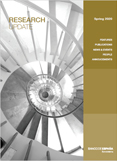
Series: Featured research.
Author: Salomón García.
Full document
Summary
I develop a macro model of the U.S. housing finance system that delivers an equilibrium connection between the securitization and mortgage credit markets. An endogenous securitization market efficiently reallocates illiquid assets, increases liquidity to fund mortgage lending, and lowers interest rates for borrowers. However, its benefits are hindered by originators’ private information about loan quality which leads to adverse selection in securitization. Fluctuations in household credit risk induce expansion and contractions of mortgage credit through the securitization liquidity channel. Adverse selection generates a multiplier effect of household shocks. Applying the theory to the Great Financial Crisis, I quantify that information frictions amplified the observed mortgage credit contraction by a factor of 1.5. The multiplier is an endogenous function of the severity of information frictions. A subsidy policy in the securitization market can stabilize liquidity and credit cycles.

